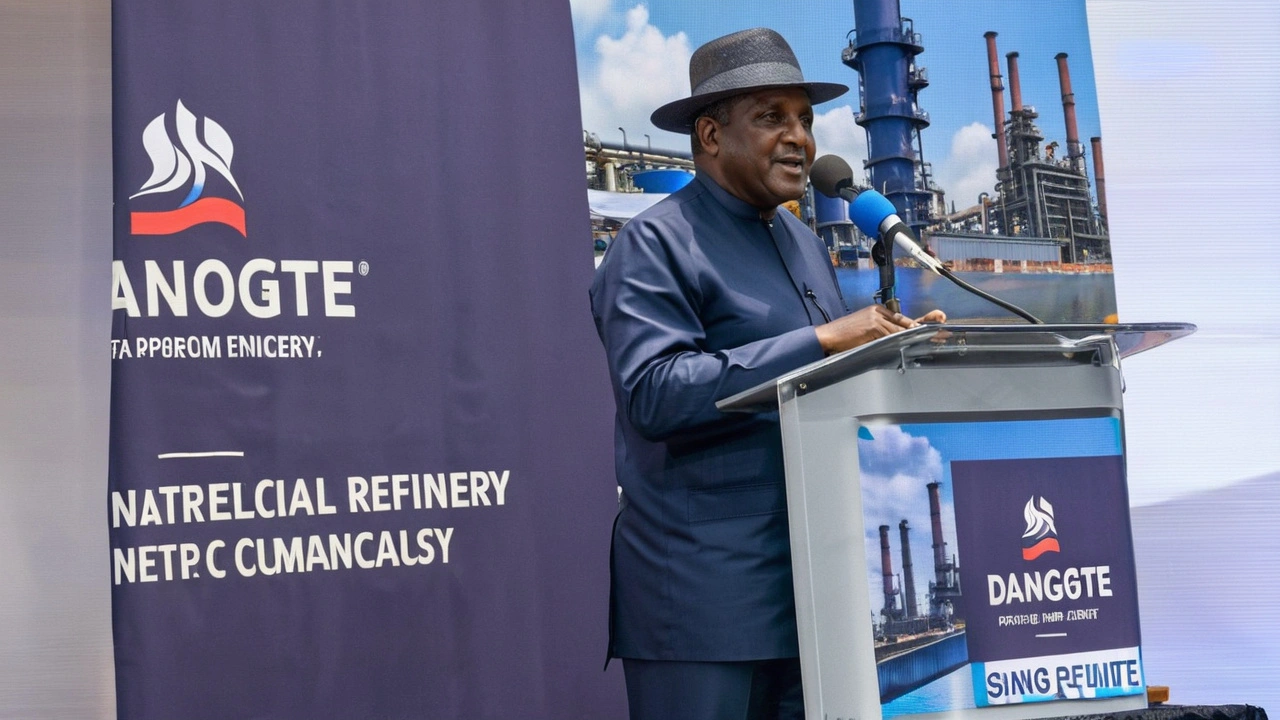Dangote Refutes Monopoly Accusations, Affirms Open Market Operations of His Group
In a recent public statement, Aliko Dangote, the renowned Chairman of the Dangote Group, categorically denied allegations that his extensive business operations create a monopoly, potentially hindering other entrepreneurs from entering various markets. These claims have been a subject of growing concern among business analysts and competitors, prompting Dangote to address the issue head-on.
Dangote, whose business empire spans several industries including cement manufacturing, sugar production, and salt refining, made it clear that his companies operate within a competitive market. He refuted any suggestions that his group deliberately prevents other businesses from participating in the same industries. According to him, these allegations are not only unsubstantiated but also misleading to the public and unfair to his business operations.
Competition and Market Dynamics
Addressing the complexities of market operations, Dangote emphasized that the industries his companies are involved in are inherently competitive. For instance, the cement industry, where Dangote Cement is a significant player, contains numerous other strong competitors vying for market share. Dangote pointed out that in such a robust competitive environment, it would be difficult, if not impossible, for any single entity to establish a monopoly.
The business tycoon further elaborated on the strategies his group deploys to stay ahead in the market. He mentioned the extensive investments in innovation, infrastructure, and workforce development that enable Dangote Group to maintain its competitive edge. Moreover, he reiterated that these investments are available to any other business willing to venture into the same industries, thus dispelling any claims of a closed market.
Response to Critics
The timing of Dangote’s statement appears to be in direct response to increasing criticisms regarding the perceived dominance of the Dangote Group in various sectors. Critics have argued that the sheer scale of Dangote’s operations and his leverage in key industries create an uneven playing field, making it challenging for smaller competitors to thrive. They contend that regulatory bodies need to scrutinize the group’s market behavior to ensure a fair competitive landscape.
However, Dangote remains steadfast in his belief that his group’s success should not be misconstrued as monopolistic behavior. He posited that success in business is often a result of strategic planning, efficient operations, and substantial reinvestment of profits into expansion and improvement. Dangote urged critics to recognize the group’s compliance with national and international business regulations.
A Call for Healthy Competition
Furthermore, Dangote encouraged other businesses to rise to the challenge and compete effectively. He highlighted that the presence of a dominant player like Dangote Group in various industries should serve as a catalyst for innovation and improvement among competitors, rather than a deterrent. He cast light on the opportunities available for businesses willing to innovate and invest wisely, stressing that market competition can foster growth and development for all participants.
In addition to his defense of the Dangote Group's market practices, Dangote also spoke about the broader economic impact of his businesses. He noted that the group’s operations have created thousands of jobs and contributed significantly to local and national economies. He argued that rather than viewing the group’s success as monopolistic, it should be seen as a driver of economic development.
Industry Perspectives
Industry experts and economists offer mixed views on the monopoly debate surrounding Dangote Group. Some argue that the scale and efficiency of Dangote’s operations naturally set a high bar for new entrants, making it tough for smaller competitors to break through. They suggest more stringent regulatory oversight to ensure a level playing field.
Conversely, there are voices within the business community that support Dangote's stance. They argue that the group's success story is a testament to what can be achieved with sound business strategy and relentless pursuit of excellence. These proponents believe that rather than clamp down on successful businesses, policies should instead focus on enabling more players to learn from and compete with industry leaders.

The Road Ahead
Moving forward, it remains to be seen how regulatory bodies will respond to these monopoly claims and Dangote’s defense. Increased scrutiny could lead to more detailed investigations into the market behaviors of dominant players like the Dangote Group. However, it is clear that Dangote remains unshaken in his stance, believing that the path to success is open to all who are willing to work for it.
Ultimately, the debate surrounding Dangote Group's business practices highlights a broader dialogue about competition, regulation, and market dynamics in today's global economy. As industries continue to evolve and new entrants attempt to make their mark, the balance between fair competition and business success will remain a critical consideration for policymakers, business leaders, and society at large.


Comments
David Werner
They've got the whole market under a veil of secrecy, and every so‑called "open" deal is just a shadow play for the elite. The cement trucks roll out at dawn, but the real profit streams are siphoned through hidden offshore channels that the public never sees. It's not just about competition; it's a coordinated effort to keep the little guys out, a grand design that only the most powerful can navigate. The very notion of a level playing field is a myth invented to placate the masses while the real masters pull the strings behind the scenes.
Every statement from the chairman reads like a script written by the same hidden forces, and the timing of his denials always coincides with whispers of new regulatory investigations. The pattern is clear: manage the narrative, silence dissent, and continue to dominate without the slightest glitch. It's a classic case of power masquerading as progress, and anyone who believes otherwise is either blind or complicit.
July 22, 2024 at 09:47
Paul KEIL
The market dynamics presented are a textbook case of vertical integration synergy leveraging economies of scale to achieve cost leadership while maintaining a diversified portfolio across commodities sectors mitigating exposure to sectoral shocks.
July 23, 2024 at 02:27
Horace Wormely
The statement contains numerous grammatical inaccuracies, notably the misuse of singular and plural forms when referring to the "group's operations" and the improper placement of commas within complex sentences. It would be advisable to revise the text for clarity and syntactic correctness.
July 23, 2024 at 19:07
christine mae cotejo
When you sift through the layers of narrative presented in this defense, you uncover a tapestry woven with threads of ambition, resilience, and an unrelenting drive toward economic transformation. The author's articulation of market openness resonates like a chorus of optimism that seeks to drown out the lingering doubts that have persisted for years.
First, the emphasis on competitive landscapes serves as an anchor, grounding the argument in the tangible reality of multiple players contesting market share. Yet, the tone quickly escalates, painting the enterprise as a beacon of progress, a lighthouse guiding fledgling firms through the fog of uncertainty.
Moreover, the discourse delves into the realm of job creation, citing thousands of positions as a testament to societal contribution, a claim that carries weight when measured against the backdrop of unemployment statistics. The narrative does not shy away from confronting the specter of monopoly accusations; instead, it embraces the critique, transforming it into a catalyst for dialogue.
Through the articulation of strategic reinvestment, the author showcases a commitment not only to profit but to the broader economic ecosystem, underscoring the importance of infrastructure development and workforce training. These elements, layered upon one another, construct a compelling case for the group's role as a catalyst for national growth.
Crucially, the author invites competitors to rise, framing the presence of a dominant player not as a barrier but as a challenge to spur innovation. This call to action reverberates, urging other entities to innovate, invest, and carve out niches within the vast market terrain.
Finally, the piece concludes with a forward‑looking statement, hinting at a regulatory horizon where scrutiny may intensify, yet the resolve remains unshaken. The optimism embedded in those closing words kindles a sense of perpetual momentum, suggesting that the journey toward equitable competition is ongoing, demanding vigilance and adaptability.
In sum, the commentary masterfully intertwines factual exposition with fervent advocacy, delivering a narrative that is both informative and inspirational, urging readers to perceive the enterprise not merely as a market leader but as a catalyst for collective advancement.
July 24, 2024 at 11:47
Douglas Gnesda
One way to look at the market structure is through the lens of capacity utilization. Dangote’s cement plants operate at upwards of 90% capacity, which translates into lower unit costs and greater price competitiveness. This scale advantage can be quantified by comparing cost per tonne of clinker: the group’s internal data suggests a reduction of roughly 15% versus the industry average. Such a margin opens up room for aggressive pricing strategies without eroding profit margins, which in turn forces rivals to either improve efficiencies or accept reduced market share. It’s also worth noting that the group’s logistics network – dedicated rail lines and private ports – cuts lead times dramatically, a factor often overlooked in standard competition analysis.
July 25, 2024 at 04:27
Abhijit Pimpale
The claim of open markets overlooks the capital barriers most entrants face; without deep pockets, scaling to competitive levels is near impossible.
July 25, 2024 at 21:07
Eric DE FONDAUMIERE
Yo the energy behind the plant expansions is off the charts. They keep pushng new tech and the workforce is super motivated. Sure there might be some hiccups but overall the vibe is that they are setting a new standard in the region, and thats def inspiring for everybody lookign at the sector.
July 26, 2024 at 13:47
Pauline Herrin
From a regulatory standpoint, the assertions of monopolistic intent remain unsubstantiated; however, continuous monitoring is advisable to ensure compliance with antitrust provisions.
July 27, 2024 at 06:27
pradeep kumar
The narrative glosses over the structural advantages that come from state‑aligned financing, which skews competition in favor of the incumbent.
July 27, 2024 at 23:07
love monster
It’s clear that the group’s success can serve as a learning template. New entrants should focus on niche innovation and leverage partnerships to offset the scale gap while maintaining ethical standards.
July 28, 2024 at 15:47
Christian Barthelt
While the public statements emphasize openness, the empirical data shows a concentration ratio above 70% in several sub‑segments, which is indicative of market power that cannot be dismissed lightly.
July 29, 2024 at 08:27
Ify Okocha
The economic impact argument is compelling, yet it risks becoming a smokescreen that deflects from the need for stricter oversight to prevent potential abuse of dominant position.
July 30, 2024 at 01:07
William Anderson
All talk, no real change.
July 30, 2024 at 17:47